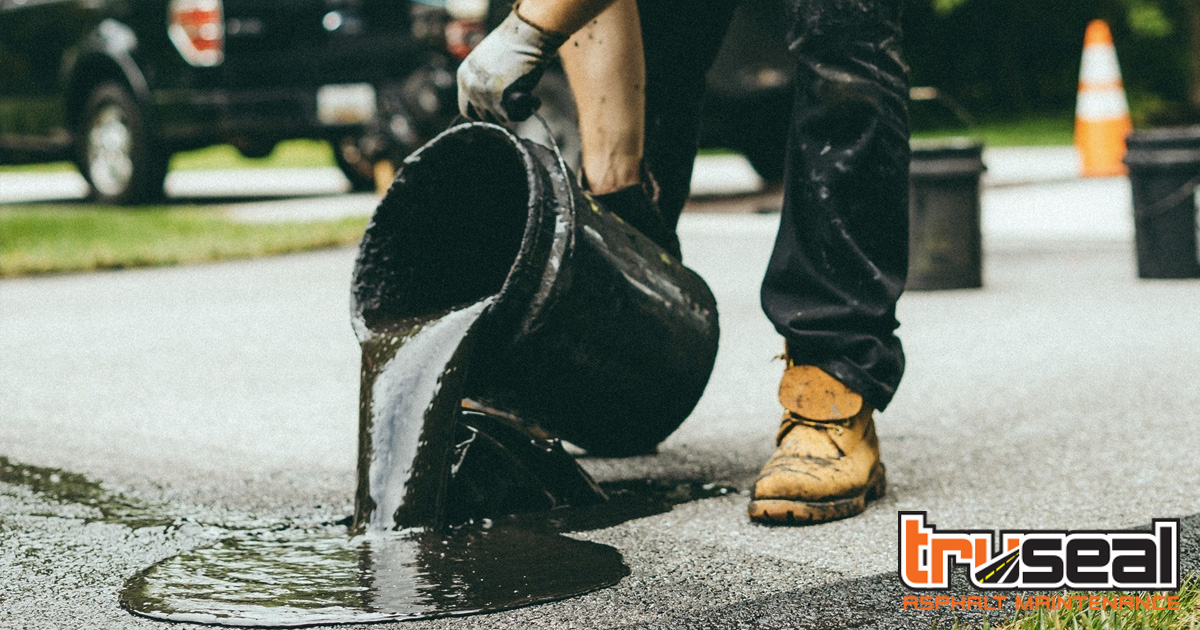 The truth about sealcoating is simple. You need it to maintain a healthy, long-lasting asphalt driveway. Wear and tear breaks down asphalt, as do environmental elements. UV rays and water dry out the asphalt. Oil leaks, gasoline, and other fluids leaking from cars contribute to pavement deterioration. Cracks can be a tripping hazard, and washed-out asphalt is unattractive. Schedule regular sealcoating to keep your driveway from cracking or becoming brittle and to extend its lifespan.
The truth about sealcoating is simple. You need it to maintain a healthy, long-lasting asphalt driveway. Wear and tear breaks down asphalt, as do environmental elements. UV rays and water dry out the asphalt. Oil leaks, gasoline, and other fluids leaking from cars contribute to pavement deterioration. Cracks can be a tripping hazard, and washed-out asphalt is unattractive. Schedule regular sealcoating to keep your driveway from cracking or becoming brittle and to extend its lifespan.
What Is Sealcoating?
Sealcoating is a defensive coating that protects your driveway from harmful environmental elements and vehicle chemical leaks. It is composed of gravel aggregate and sand combined with a petroleum-based binder to make it pliable and flexible. The contractor applies a thin coat to the properly prepped surface restoring the durability and attractiveness of the driveway. A thick coat of sealant applied to the unprepared pavement will do more harm than good.
How Often Is Sealing Necessary?
Several factors come into play when deciding how often to apply sealant to your pavement. A climate with extreme freeze-thaw will break down the asphalt faster. How many cars park on your driveway regularly? Are those vehicles well-maintained, or do they leak fluids? All asphalt ages differently, but having a contractor apply a sealant periodically to your driveway can double its lifespan. A general rule of thumb is to sealcoat it every two to three years. However, it’s best to err on the side of caution to protect the entry into your home and garage.
Tree roots are the likely culprit if the pavement is buckling near a large tree. You must address the root problem before doing asphalt maintenance to prevent further damage. It’s time for you to act fast if you start seeing minor cracks in your driveway. Asphalt sealcoating is very effective on properly prepped surfaces. It won’t be able to do its job on a subpar surface. An asphalt contractor can ensure the sealant is applied correctly.
Driveway Sealing Considerations
Is sealcoating your driveway always a good idea? You can seal asphalt too soon. Asphalt needs three to six months to cure. That allows excess binder chemicals to dissipate so you don’t damage your new pavement. The sealer’s essential commodity is an acrylic-based or bituminous liquid mixed with other fillers that will seal the asphalt. A premium formula mixes those liquids with silica sand, water, other substances, and polymer to protect the parking area. The finished product is only effective when applied at the proper temperature. In addition, a person should never use a thick layer, or it won’t set correctly.
Common Sense About Sealcoating
It’s easy to let driveway maintenance fly off of the radar until it becomes urgent. Regularly inspect your pavement to look for cracks, holes, or buckling. If your driveway looks like it’s seen better days, it’s likely time for sealcoating. It increases your home’s curb appeal and indicates your interest in proper maintenance. If you apply it incorrectly, or don’t give it time to cure, you’ll have a big mess on your hands. People walking on uncured coating will leave tracks everywhere they go. That won’t fare well for your walkways or interior flooring and is incredibly difficult to remove.
Schedule regular sealcoating to keep your driveway and paved areas in shape. Call TruSeal Asphalt Maintenance today. You’ll be glad you left this messy job to the professionals!

Ian Chaput is the President and Founder of TruSeal Asphalt & Concrete, with a rich background in business and marketing from the University of Delaware and extensive experience in the asphalt trade. Under his leadership, TruSeal has become a testament to his commitment to exceptional customer service and quality workmanship. Ian oversees the company’s strategic planning, customer relations, and social media presence, driving forward the values that have made TruSeal a trusted name in the industry.
Contact Us
"*" indicates required fields
